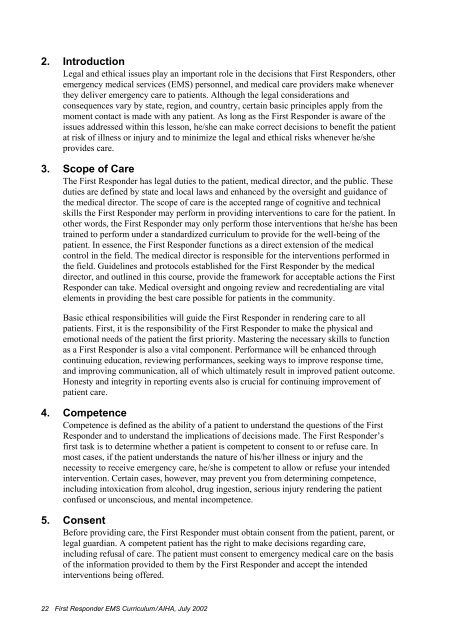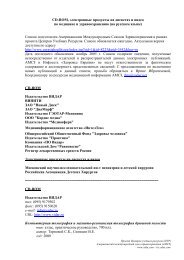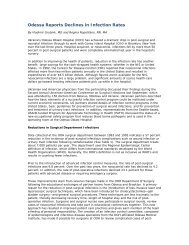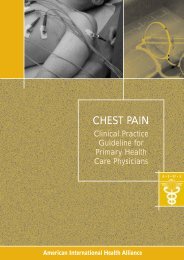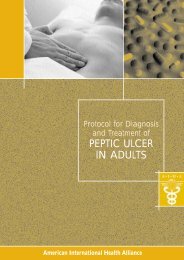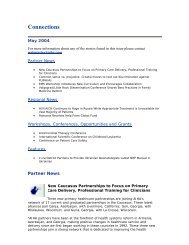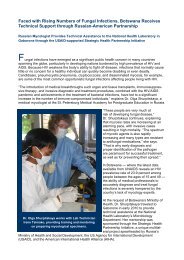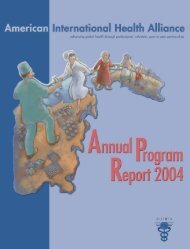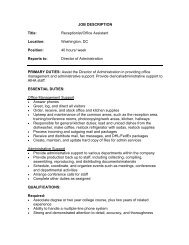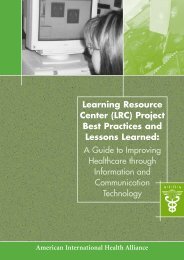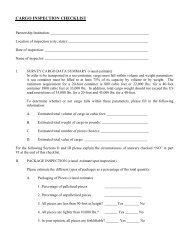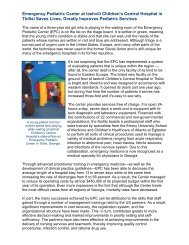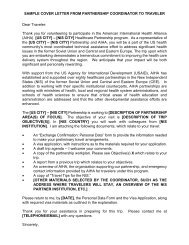First Responder EMS Curriculum for Training Centers in Eurasia
First Responder EMS Curriculum for Training Centers in Eurasia
First Responder EMS Curriculum for Training Centers in Eurasia
You also want an ePaper? Increase the reach of your titles
YUMPU automatically turns print PDFs into web optimized ePapers that Google loves.
2. IntroductionLegal and ethical issues play an important role <strong>in</strong> the decisions that <strong>First</strong> <strong>Responder</strong>s, otheremergency medical services (<strong>EMS</strong>) personnel, and medical care providers make wheneverthey deliver emergency care to patients. Although the legal considerations andconsequences vary by state, region, and country, certa<strong>in</strong> basic pr<strong>in</strong>ciples apply from themoment contact is made with any patient. As long as the <strong>First</strong> <strong>Responder</strong> is aware of theissues addressed with<strong>in</strong> this lesson, he/she can make correct decisions to benefit the patientat risk of illness or <strong>in</strong>jury and to m<strong>in</strong>imize the legal and ethical risks whenever he/sheprovides care.3. Scope of CareThe <strong>First</strong> <strong>Responder</strong> has legal duties to the patient, medical director, and the public. Theseduties are def<strong>in</strong>ed by state and local laws and enhanced by the oversight and guidance ofthe medical director. The scope of care is the accepted range of cognitive and technicalskills the <strong>First</strong> <strong>Responder</strong> may per<strong>for</strong>m <strong>in</strong> provid<strong>in</strong>g <strong>in</strong>terventions to care <strong>for</strong> the patient. Inother words, the <strong>First</strong> <strong>Responder</strong> may only per<strong>for</strong>m those <strong>in</strong>terventions that he/she has beentra<strong>in</strong>ed to per<strong>for</strong>m under a standardized curriculum to provide <strong>for</strong> the well-be<strong>in</strong>g of thepatient. In essence, the <strong>First</strong> <strong>Responder</strong> functions as a direct extension of the medicalcontrol <strong>in</strong> the field. The medical director is responsible <strong>for</strong> the <strong>in</strong>terventions per<strong>for</strong>med <strong>in</strong>the field. Guidel<strong>in</strong>es and protocols established <strong>for</strong> the <strong>First</strong> <strong>Responder</strong> by the medicaldirector, and outl<strong>in</strong>ed <strong>in</strong> this course, provide the framework <strong>for</strong> acceptable actions the <strong>First</strong><strong>Responder</strong> can take. Medical oversight and ongo<strong>in</strong>g review and recredential<strong>in</strong>g are vitalelements <strong>in</strong> provid<strong>in</strong>g the best care possible <strong>for</strong> patients <strong>in</strong> the community.Basic ethical responsibilities will guide the <strong>First</strong> <strong>Responder</strong> <strong>in</strong> render<strong>in</strong>g care to allpatients. <strong>First</strong>, it is the responsibility of the <strong>First</strong> <strong>Responder</strong> to make the physical andemotional needs of the patient the first priority. Master<strong>in</strong>g the necessary skills to functionas a <strong>First</strong> <strong>Responder</strong> is also a vital component. Per<strong>for</strong>mance will be enhanced throughcont<strong>in</strong>u<strong>in</strong>g education, review<strong>in</strong>g per<strong>for</strong>mances, seek<strong>in</strong>g ways to improve response time,and improv<strong>in</strong>g communication, all of which ultimately result <strong>in</strong> improved patient outcome.Honesty and <strong>in</strong>tegrity <strong>in</strong> report<strong>in</strong>g events also is crucial <strong>for</strong> cont<strong>in</strong>u<strong>in</strong>g improvement ofpatient care.4. CompetenceCompetence is def<strong>in</strong>ed as the ability of a patient to understand the questions of the <strong>First</strong><strong>Responder</strong> and to understand the implications of decisions made. The <strong>First</strong> <strong>Responder</strong>’sfirst task is to determ<strong>in</strong>e whether a patient is competent to consent to or refuse care. Inmost cases, if the patient understands the nature of his/her illness or <strong>in</strong>jury and thenecessity to receive emergency care, he/she is competent to allow or refuse your <strong>in</strong>tended<strong>in</strong>tervention. Certa<strong>in</strong> cases, however, may prevent you from determ<strong>in</strong><strong>in</strong>g competence,<strong>in</strong>clud<strong>in</strong>g <strong>in</strong>toxication from alcohol, drug <strong>in</strong>gestion, serious <strong>in</strong>jury render<strong>in</strong>g the patientconfused or unconscious, and mental <strong>in</strong>competence.5. ConsentBe<strong>for</strong>e provid<strong>in</strong>g care, the <strong>First</strong> <strong>Responder</strong> must obta<strong>in</strong> consent from the patient, parent, orlegal guardian. A competent patient has the right to make decisions regard<strong>in</strong>g care,<strong>in</strong>clud<strong>in</strong>g refusal of care. The patient must consent to emergency medical care on the basisof the <strong>in</strong><strong>for</strong>mation provided to them by the <strong>First</strong> <strong>Responder</strong> and accept the <strong>in</strong>tended<strong>in</strong>terventions be<strong>in</strong>g offered.22<strong>First</strong> <strong>Responder</strong> <strong>EMS</strong> <strong>Curriculum</strong>/AIHA, July 2002


